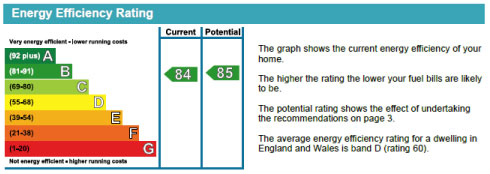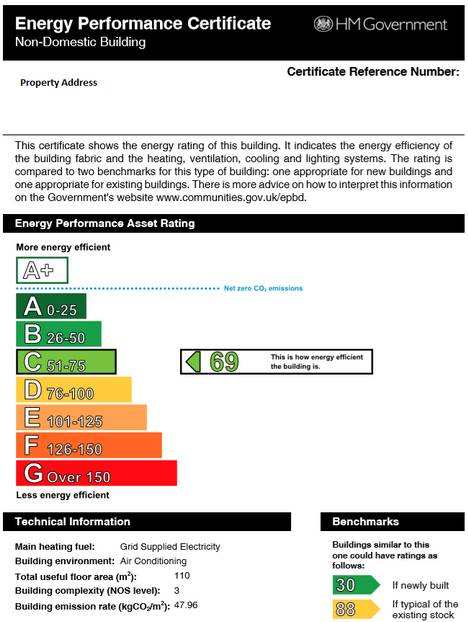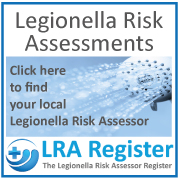About the Domestic EPC
It is a legal requirement in certain situations and a good idea for pretty much everybody as it contains a 'recommendation report' with suggestions on how you can reduce the amount you spend on energy. You receive an EPC after an assessment by a qualified and authorised assessor, so you know the Certificate accurately reflects the reality of energy use in your dwelling.
How does an EPC work?
The EPC rates the home's performance in terms of energy use per square metre of floor area, energy efficiency based on fuel costs, and environmental impact based on carbon dioxide (CO2) emissions. This provides an energy efficiency rating and an environmental impact (CO2) rating.
There are seven bands for both of these ratings, from A to G. The energy efficiency rating is colour-coded from green to red, with the green end of the scale indicating that the home is very energy efficient, with lower running costs, and the red end of the scale indicating it is not energy efficient and has higher running costs.
There is also a numerical rating from 1 - 100. The bigger the number the more energy efficient the home is and the lower the fuel bills will be.
The environmental impact rating is colour-coded from blue to grey, signifying 'very environmentally friendly - lower CO2 emissions' at the blue end of the scale through to 'not environmentally friendly - higher CO2 emissions' at the grey end.
Again, there is a numerical rating, from 1 - 100, and the bigger the number, the less impact the house has on the environment.
Estimated fuel costs
The EPC assessor uses standardised assumptions about the home's occupancy, heating patterns and geographical location to construct a table that indicates how much it will cost to provide lighting, heating and hot water to this dwelling.
The table sets out the current energy use alongside the potential use if a range of recommendations are followed. The same is done for carbon dioxide emissions.
Costs are listed for lighting, heating and hot water - again, there is a figure for the current and potential cost, showing how much could be saved in cash terms.
If you are scrutinising an EPC, always check the date the certificate was issued, because fuel prices can increase over time.
Detailed performance summary
Having provided details of actual and potential energy use and cost outlay, the EPC provides a summary of the home's energy performance-related features. These include walls, roof, floor, windows, main heating, heating controls, secondary heating (if applicable), hot water and lighting.
Each element is assessed against the following scale: Very poor/Poor/Average/Good/Very good. So, for example, your wall might be described as: Cavity wall, as built (no insulation). It would then probably be described as 'poor' for its performance in terms of both energy efficiency and environmental impact. A pitched roof with 250mm loft insulation, however, might warrant being described as 'good'.
If there was low energy lighting in 75% of fixed outlets, this would rank as 'very good' by both measures.
EPC recommendations
The EPC provides a list of suggested measures to achieve cost effective improvements to performance ratings. The table outlines the typical savings per year and the potential performance ratings after the improvements have been made. The improvements are divided into 'lower cost measures' of up to £500 and 'higher cost measures' for larger amounts.
So, for example, low cost measures such as fitting cavity wall insulation might achieve a typical annual saving of over £400, while installing low energy lighting in all fixed outlets would deliver a saving of over £11. High cost measures might include fitting a hot water cylinder thermostat or replacing an old boiler with a more efficient model.
Further suggestions - for example, fitting double glazing and solar heating panels - are included for those aiming for the highest possible standards for their home.
Explanatory text is provided on each measure to help the reader decide what is involved in taking the suggested action. This includes information on which improvements may be eligible for funding through the government's Green Deal (see below).
There is no requirement to act on the recommendations in the report. However, doing so could make the property more attractive for sale or rent by making it more energy efficient.
When you are required to get an EPC
An EPC is required by law when a building is built, sold or put up for rent. If you are a landlord or homeowner and need to provide an EPC, you'll need to contact an accredited domestic energy assessor. They will carry out the assessment and produce the certificate.
Domestic energy assessors may be employed by a company (like an estate agent or energy company) or be self-employed. You should always check that your domestic energy assessor belongs to an accreditation scheme.
EPCs are valid for 10 years and the fee charged by the assessor will be at the market rate. The size and location of your property will be determining factors.
When you'll be given an EPC
By law you should receive an EPC in the following cases:
When you are considering buying a home, you should be provided with an EPC, free of charge. This applies to new homes and existing stock.
If you are considering renting a property, you should get an EPC from the landlord, free of charge. That said, you don't need an EPC when you are thinking of just renting a room with shared facilities rather than renting the whole property.
In all cases the intention is to allow you to compare the energy efficiency and costs associated with the property.
Voluntary EPCs
You can apply for and receive an EPC from an energy assessor simply because you want to know how energy efficient your home is, and make improvements suggested by the report.
You can also look at the EPCs of other properties on the EPC register website. This lets you compare your home's energy performance with that of similar homes free of charge.
Check if your property has an EPC
If you’re think your property already has an EPC you can find out by clicking the link below. This will take you to the epc register where you can enter your postcode to check if an epc exists on your property.
If your property does not have and epc you can order one by choosing your country from the menu on the left. This will take you directly to The EPC Man web site where you can find your local fully accredited EPC provider.
All energy assessors on our site are fully qualified and accredited with at least one of the official accreditation bodies shown opposite.
To find out if your property already has an epc please visit the Landmark EPC Register.
About the Commercial EPC
A Commercial EPC can cover a wide variety of properties including shops, offices, care homes, factories, showrooms and garages.
A Commercial Energy Performance Certificate (EPC) can only be produced by a qualified Non Domestic Energy Assessor who is a current member of one of the official accreditation bodies. All of our members are fully qualified, insured and accredited.
All commercial property that is sold or let must have an Energy Performance Certificate (EPC) commissioned prior to, or within 7 days of being put on the market. There is a further 21 days allowed for the completion and acquisition of the EPC after which time fines can be imposed. The Energy Performance Certificate (epc) will be produced by the assessor. This will then be sent by email to your agent or solicitor. You can also have a copy by email if required.
If you do not get an EPC when you need one, you can be fined.
An EPC contains information about a property’s energy use and typical energy costs as well as recommendations about how to reduce energy use and save money. The EPC gives a property an energy efficiency rating from A (most efficient) to G (least efficient) and it is currently valid for 10 years.
All commercial property that is sold or let must have an Energy Performance Certificate (EPC) commissioned prior to, or within 7 days of being put on the market . There is a further 21 days allowed for the completion and acquisition of the EPC after which time fines can be imposed.
Since 1st October 2008, all non-domestic buildings on construction, sale and rent require a Non-Domestic Energy Performance Certificate (NDEPC) and a Recommendation Report (RR). This information will help owners and occupiers make their building more energy efficient and allow potential buyers and tenants to compare the energy performance of different buildings.
All large public buildings require an annual Display Energy Certificate (DEC) highlighting their energy performance. This is to be displayed prominently in a place visible to the public. These buildings will also require an Advisory Report (AR) providing recommendations for energy improvements each seven years.
Air conditioning systems first put into service on or after 1st January 2008 require an air conditioning inspection every five years from the date on which the system was first put into service. For systems with an effective rated output of more than 250kW put into service before 1st January 2008, an air conditioning inspection is required by 4th January 2009, and every five years thereafter. For systems with an effective rated output of more than 12kW put into service before 1st January 2008, an air conditioning inspection is required by 4th January 2011, and every five years thereafter.
Our assessors would be delighted to offer you a free quote for your commercial energy performance certificate. You can make an appointment which fits in with your diary for the assessor to undertake the EPC.
ister.




